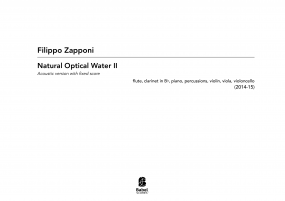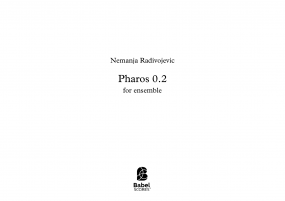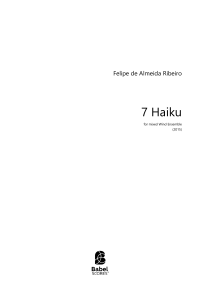Recherche avancée
The Book of Ingenious Devices
13,39 €
Version numérique (+0,00 €) à télécharger
Version papier (+16,20 € impression et livraison ). Colissimo7-14 days aprox.
Chez BabelScores, quand vous achetez une partition, vous pouvez ensuite contacter directement le compositeur ici même !
Caractéristiques
Region
North America (Canada - USA)
Estimated Duration
11 - 15min
Date
2009
ISMN : 979-0-2325-1416-1
In Stock
Notes sur cette pièce
The Book of Ingenious Devices
The title of the piece is taken from a 9th century book by three Persian brothers (Ahmad, Muhammad and Hasan bin Musa ibn Shakir), working in the House of Wisdom in Baghdad, a major intellectual center of the Islamic Golden Age. The book is hailed as one of the most important achievements of medieval Islam. It contains detailed and illustrated descriptions of about one hundred devices, most of which are early models of what we use today, including the earliest known model of a mechanical musical instrument. This work is a fascinating example of the interfaces between the East and the West; an essential node in the circulation of knowledge from ancient Greece to the Middle East in medieval ages, finally finding an audience in Early Renaissance Europe.
Taking its cue from this strange collection of bizarre instruments, The Book Of Ingenious Devices plays with the idea of assembling relatively complex structure from simple elements. Just like a watch, made up of numerous small and basic parts, the piece is constructed almost entirely from quite simple musical elements, such as lines and dots. They form more elaborate mechanical structures through the trajectory of the piece although none of them achieve ultimate perfection in their construction. The piece cycles through these little automata until they accumulate into the most elaborate form at the end but that also comes with its own glitches just like the frustrating experience of building a mechanical device.
Ajouter à une playlist
- Identifiez-vous pour créer une liste
The Book of Ingenious Devices
The title of the piece is taken from a 9th century book by three Persian brothers (Ahmad, Muhammad and Hasan bin Musa ibn Shakir), working in the House of Wisdom in Baghdad, a major intellectual center of the Islamic Golden Age. The book is hailed as one of the most important achievements of medieval Islam. It contains detailed and illustrated descriptions of about one hundred devices, most of which are early models of what we use today, including the earliest known model of a mechanical musical instrument. This work is a fascinating example of the interfaces between the East and the West; an essential node in the circulation of knowledge from ancient Greece to the Middle East in medieval ages, finally finding an audience in Early Renaissance Europe.
Taking its cue from this strange collection of bizarre instruments, The Book Of Ingenious Devices plays with the idea of assembling relatively complex structure from simple elements. Just like a watch, made up of numerous small and basic parts, the piece is constructed almost entirely from quite simple musical elements, such as lines and dots. They form more elaborate mechanical structures through the trajectory of the piece although none of them achieve ultimate perfection in their construction. The piece cycles through these little automata until they accumulate into the most elaborate form at the end but that also comes with its own glitches just like the frustrating experience of building a mechanical device.
Instrumentation
Flute|Clarinet|Percussions (2)|Violin (2)|Viola|Cello|Piano|
Recording
Callithumpian Consort conducted by Stephan Drury
Score Details
Format - A4 / US Letter
Pages - 84
Pages - 84







